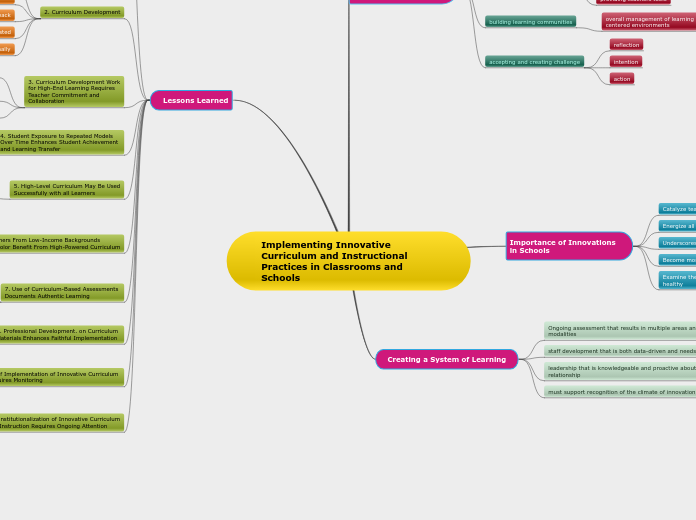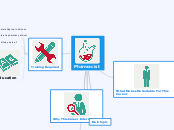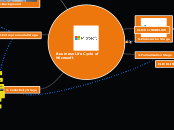Implementing Innovative Curriculum and Instructional Practices in Classrooms and Schools
Lessons Learned
10. Institutionalization of Innovative Curriculum
and Instruction Requires Ongoing Attention
Guided and Intensive professional
development and monitoring
Long-Term sustainability
9. Fidelity of Implementation of Innovative Curriculum
Efforts Requires Monitoring
Documentation matters
Curriculum needs to be monitored
Significant part
of the curriculum
8. Professional Development. on Curriculum
Materials Enhances Faithful Implementation
Advanced intsructional practices
differentiation strategies
Teacher is the key
7. Use of Curriculum-Based Assessments
Documents Authentic Learning
Measure aspects of content, concept and process learning
Essential component for measuring effectivess
of a curriculum
6. Promising Learners From Low-Income Backgrounds
and Students of Color Benefit From High-Powered Curriculum
Curriculum must be accompanied by faithful
use of teaching-learning models
William and Mary units are effective
with special population of promising learners
5. High-Level Curriculum May Be Used
Successfully with all Learners
Title 1 classrooms are good with nongifted learners
Flexible grouping techniques
Scaffolding
proper differentiation
4. Student Exposure to Repeated Models
Over Time Enhances Student Achievement
and Learning Transfer
Research-based, packaged curriculum
Teaching and Learning Models
3. Curriculum Development Work
for High-End Learning Requires
Teacher Commitment and
Collaboration
Careful instructional decision making
Curriculum that will significantly enhance
student achievement
Discipline-specific expertise
2. Curriculum Development
Units are revised and distributed nationally
Units are field-tested
Revisions based on triangulation of the feedback
Pilot the entire unit
Review of relevant research
Standards and curriculum
reform research
1: Curriculum Design
Metacognition and reflection components
Broad-based concept
Accelerated reading and advanced resources
graphic organizers
Inquiry-based, meaningful, hands-on and minds-on experiences
Higher-level thinking and reasoning
activities
questioning
Authentic assessments
process
concept
content
Learning goals and anticipated outcomes
Creating a System of Learning
must support recognition of the climate of innovation
leadership that is knowledgeable and proactive about the relationship
staff development that is both data-driven and needs-based
Ongoing assessment that results in multiple areas and modalities
Importance of Innovations
in Schools
Examine the adequacy of current practices in ways that are healthy
Become more aware of educationla practices
Underscores effort, persistence and practice
Energize all staff in pro-active ways
Catalyze teachers and principals
Role of Leadership in Supporting Innovative Practices
accepting and creating challenge
action
intention
reflection
building learning communities
overall management of learning
centered environments
integrity and helping people
providing teachers tools
making teacher stronger
attend overall growth
multiple realities of working
create meaning
organizational structure
task commitment skills
human relation skills









